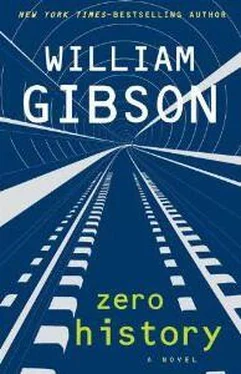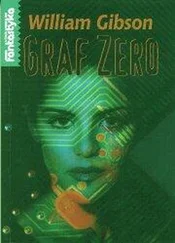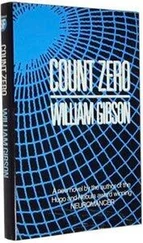William Gibson - Zero history
Здесь есть возможность читать онлайн «William Gibson - Zero history» весь текст электронной книги совершенно бесплатно (целиком полную версию без сокращений). В некоторых случаях можно слушать аудио, скачать через торрент в формате fb2 и присутствует краткое содержание. Жанр: Фантастика и фэнтези, на чешском языке. Описание произведения, (предисловие) а так же отзывы посетителей доступны на портале библиотеки ЛибКат.
- Название:Zero history
- Автор:
- Жанр:
- Год:неизвестен
- ISBN:нет данных
- Рейтинг книги:4 / 5. Голосов: 1
-
Избранное:Добавить в избранное
- Отзывы:
-
Ваша оценка:
- 80
- 1
- 2
- 3
- 4
- 5
Zero history: краткое содержание, описание и аннотация
Предлагаем к чтению аннотацию, описание, краткое содержание или предисловие (зависит от того, что написал сам автор книги «Zero history»). Если вы не нашли необходимую информацию о книге — напишите в комментариях, мы постараемся отыскать её.
Zero history — читать онлайн бесплатно полную книгу (весь текст) целиком
Ниже представлен текст книги, разбитый по страницам. Система сохранения места последней прочитанной страницы, позволяет с удобством читать онлайн бесплатно книгу «Zero history», без необходимости каждый раз заново искать на чём Вы остановились. Поставьте закладку, и сможете в любой момент перейти на страницу, на которой закончили чтение.
Интервал:
Закладка:
“Not like that, it isn’t.”
“Are you in any trouble yourself?”
“Are you kidding? I’ve got a prenup thicker than fuckstick’s long. It’s his problem. I just needed to get the fuck out of Dodge.”
“I never understood why you married him.”
“It was an experiment. What about you? What are you doing here?”
“Working for Hubertus Bigend,” Hollis said, noting just how little she enjoyed saying it.
Heidi’s eyes widened. “Fuck me. That asshole? You couldn’t stand him. Creeped you totally out. Why?”
“I guess I need the money.”
“How bad did the crash do you?”
“About half.”
Heidi nodded. “Did everybody about half. Unless you had somebody like fuckstick doing your investing for you.”
“And you didn’t?”
“Are you kidding? Separation of church and fucking state. Always. I never thought he had any sense that way anyway. Other people did, though. Know what?”
“What?”
“The salt of the fucking earth never tells you it’s the salt of the fucking earth. People who get scammed, they’re all people who don’t know that.”
“I think I’ll have a whiskey.”
“Be my guest,” said Heidi. Then smiled. “Good to fucking see you.” And started to cry.
10. EIGENBLICH
Milgrim woke, took his medication, showered, shaved, brushed his teeth, dressed, and left the Neo charging but turned on. The U.K. plug-adaptor was larger than the phone’s charger. Keeping the dressmaker’s dummy out of his field of vision, he left the room.
In the silent Japanese elevator, descending three floors, he considered pausing to Google Hollis Henry on the lobby MacBook, but someone was using it when he got there.
He wasn’t always entirely comfortable with the lobby here, what there was of it. He felt like he might look as though he were here to steal something, though aside from his wrinkled post-flight clothing he was fairly certain he didn’t. And really, he thought, stepping out into Monmouth Street and tentative sunlight, he wouldn’t. Had no reason to. Three hundred pounds in a plain manila envelope in the inside pocket of his jacket, and nothing, today, telling him what he needed to do with it. Still a novel situation, to a man of his history.
Addictions, he thought, turning right, toward Seven Dials’ namesake obelisk, started out like magical pets, pocket monsters. They did extraordinary tricks, showed you things you hadn’t seen, were fun. But came, through some gradual dire alchemy, to make decisions for you. Eventually, they were making your most crucial life-decisions. And they were, his therapist in Basel had said, less intelligent than goldfish.
He went to Caffe Nero, a tastier alternate-reality Starbucks, crowded now. He ordered a latte and a croissant, the latter shipped frozen from France, baked here. He approved of that. Saw a small round table being vacated by a woman in a pinstriped suit and swiftly occupied it, looking out at the Vidal Sassoon, across the little roundabout, where young hairdressers were going in to work.
Eating his croissant, he wondered what Bigend might be up to with designer combat pants. He was a good listener, careful to not let people know it, but Bigend’s motives and modus eluded him. They could seem almost aggressively random.
Military contracting was essentially recession-proof, according to Bigend, and particularly so in America. That was a part of it, and perhaps even the core of it. Recession-proofing. And Bigend seemed centered on one area of military contracting, the one in which, Milgrim supposed, Blue Ant’s strategic skill set was most applicable. Blue Ant was learning everything it could, and very quickly, about the contracting, design, and manufacture of military clothing. Which seemed, from what Milgrim had seen so far, to be a very lively business.
And Milgrim, for whatever reason or lack of one, was along for the ride. That was what Myrtle Beach had been about.
Volunteer armies, the French girl had said, the one who’d worn the plaid kilt at yesterday’s meeting, in an earlier PowerPoint presentation that Milgrim had found quite interesting, required volunteers, the bulk of them young men. Who might otherwise be, for instance, skateboarding, or at least wearing clothing suggestive of skateboarding. And male streetwear generally, over the past fifty years or so, she said, had been more heavily influenced by the design of military clothing than by anything else. The bulk of the underlying design code of the twenty-first-century male street was the code of the previous midcentury’s military wear, most of it American. The rest of it was work wear, most of that American as well, whose manufacture had coevolved with the manufacture of military clothing, sharing elements of the same design code, and team sportswear.
But now, according to the French girl, that had reversed itself. The military needed clothing that would appeal to those it needed to recruit. Every American service branch, she said, illustrating each with a PowerPoint slide, had its own distinctive pattern of camouflage. The Marine Corps, she said, had made quite a point of patenting theirs (up close, Milgrim had found it too jazzy).
There was a law in America that prohibited the manufacture of American military clothing abroad.
And that was where Bigend, Milgrim knew, hoped to come in. Things that were manufactured in America didn’t necessarily have to be designed there. Outerwear and sporting-goods manufacturers, along with a few specialist uniform manufacturers, competed for contracts to manufacture clothing for the U.S. military, but that clothing had previously been designed by the U.S. military. Who now, the French girl had said, somewhat breathlessly, as though she were closing in on a small animal in some forest clearing, clearly lacked the newly requisite design skills to do that. Having invented so much of contemporary masculine cool in the midcentury, they found themselves competing with their own historical product, reiterated as streetwear. They needed help, the French girl had said, her mouse clicks summoning a closing flurry of images, and they knew it.
He sipped his latte, looking out, watching people pass, wondering if he could see the French girl’s thesis proven in the garments of this morning’s pedestrians. If you thought of it as a kind of pervasive subtext, he decided, you could.
“Excuse me. Would you mind if I shared the table?”
Milgrim looked up at this smiling American, ethnically Chinese, in her black sweatshirt, a small plain gold cross, gold-chained, worn atop it, one white plastic barrette visible, as some unsleeping module of addict street-alertness, hardwired to his very core, crisply announced: cop.
He blinked. “Of course. You’re welcome.” Feeling muscles in his thighs bunching, tight, readying themselves for the dash out the door. Malfunction, he told the module. Post-acute withdrawal syndrome. Flashback: His limbic brain was grooved for this, like the tracks of the wheels of Conestoga wagons, worn ankle-deep in sandstone.
She put her sacklike white pleather purse on the table, her plastic-lidded pale blue Caffe Nero cup beside it, pulled out the chair opposite him, and sat. Smiled.
Embroidered in white, on the black sweatshirt, were the crescent moon and palm tree of the South Carolina state flag, a bit larger than one of Ralph Lauren’s polo ponies. Milgrim’s buried module instantly extruded an entire DEW line of arcane cop-sensing apparatus.
Paranoia, his therapist had told him, was too much information. He had that now as the woman dipped into her purse, brought up a matte silver phone, opened it, and furrowed her brow. “Messages,” she said.
Milgrim looking straight into the infinitely deep black pupil that was the phone’s camera. “Uh-oh,” she said, “I see I have to run. Thanks anyway!” And up, purse under her arm, and out into Seven Dials.
Читать дальшеИнтервал:
Закладка:
Похожие книги на «Zero history»
Представляем Вашему вниманию похожие книги на «Zero history» списком для выбора. Мы отобрали схожую по названию и смыслу литературу в надежде предоставить читателям больше вариантов отыскать новые, интересные, ещё непрочитанные произведения.
Обсуждение, отзывы о книге «Zero history» и просто собственные мнения читателей. Оставьте ваши комментарии, напишите, что Вы думаете о произведении, его смысле или главных героях. Укажите что конкретно понравилось, а что нет, и почему Вы так считаете.











